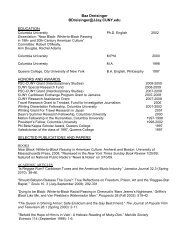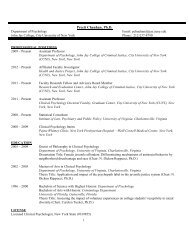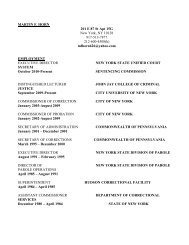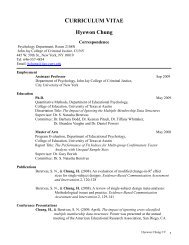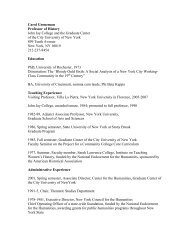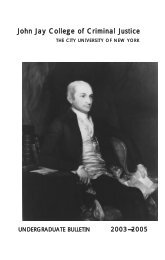Bulletin - John Jay College Of Criminal Justice - CUNY
Bulletin - John Jay College Of Criminal Justice - CUNY
Bulletin - John Jay College Of Criminal Justice - CUNY
Create successful ePaper yourself
Turn your PDF publications into a flip-book with our unique Google optimized e-Paper software.
Courses <strong>Of</strong>fered<br />
develop critical skills such as close reading, analysis, organized<br />
thought, and effective writing.<br />
Prerequisite: ENG 102 or 201. Prerequisite or co-requisite: LIT 260<br />
or permission of the instructor<br />
LIT 371 Topics in Medieval Literature<br />
3 hours, 3 credits<br />
Topics in Medieval Literature may focus on a literary genre or<br />
convention (e.g., epic, romance) or an important theme (e.g.,<br />
chivalric and warrior codes, heresy and devotion, impermanence,<br />
erotic love) as a means of understanding the literature of the period.<br />
Each semester individual instructors will anchor the course in<br />
specific sub-topics, primary texts, cultures, historical moments, etc.,<br />
depending on their own areas of specialization. The course will<br />
approach the canon for this period not as a fixed entity but as a body<br />
of work consistently open to reevaluation and critique; alternative<br />
texts, voices, and subject positions relevant to the topic(s) will be<br />
included. Topics in Medieval Literature will examine select literary<br />
movements, authors, and ideas with an eye to the formal features of<br />
texts as well as the social, historical, and political contexts in which<br />
they appear.<br />
Prerequisite: ENG 102 or 201. Prerequisite or co-requisite: LIT 260<br />
or permission of the instructor<br />
LIT 372 Topics in Early Modern Literature<br />
3 hours, 3 credits<br />
Topics in Early Modern Literature may focus on a literary genre or<br />
convention (e.g., drama, sonnet) or an important theme (e.g., the<br />
Other in literature, hierarchy, literature of love, monarchy in crisis) as<br />
a means of understanding the literature of the period. The specific<br />
focus of the course will be determined by the individual professor<br />
and may be concerned exclusively with English literature, Western<br />
Literature more broadly, or Western and non-Western literature. The<br />
course will approach the canon for this period not as a fixed entity<br />
but as a body of work consistently open to reevaluation and critique;<br />
alternative texts, voices, and subject positions relevant to the topic(s)<br />
will be included. Topics in Early Modern Literature will examine<br />
major and minor literary movements, authors, or ideas at work in<br />
16th- and 17th-century literature with an eye to the formal features of<br />
texts as well as the social, historical, and political contexts in which<br />
they appear.<br />
Prerequisite: ENG 102 or 201. Prerequisite or co-requisite: LIT 260<br />
or permission of the instructor<br />
LIT 373 Topics in Seventeenth and Eighteenth-<br />
Century Literature<br />
3 hours, 3 credits<br />
Topics in Seventeenth and Eighteenth-Century Literature introduces<br />
students to a pivotal period that witnessed the development of modern<br />
politics and democracy, the rise of the novel, the appearance of the<br />
professional woman writer, and the emergence of Enlightenment<br />
philosophy and literature. As a means of understanding the literature of<br />
the period, the course may focus on a literary genre or mode (e.g., the<br />
novel, satire, sentimentality) or on an important theme (e.g.,<br />
nationalism, colonialism, human rights, parliamentary democracy,<br />
status and class, revolution, the rise of Enlightenment thought, The<br />
Black Atlantic, New Science and the human). The specific focus of the<br />
course will be determined by the individual professor, and specific<br />
syllabi may draw on British literature and Western Literature more<br />
broadly, as well as on Anglophone literature and/or literature in<br />
translation originating from locations and cultures around the globe.<br />
The course will approach the canon of this period as a body of work<br />
consistently open to reevaluation and critique; alternative texts, voices,<br />
and perspectives relevant to the topic(s) will be included. Topics in<br />
Seventeenth and Eighteenth-Century Literature is one of six historically<br />
specific Topics courses, students majoring in English are required to<br />
take four.<br />
Prerequisite: ENG 102 or 201 Prerequisite or co-requisite: LIT 260<br />
or permission of the instructor<br />
115



